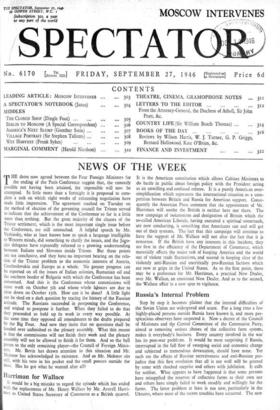NEWS OF THE WEEK
THE dates now agreed between the Four Foreign Ministers for the ending of the Paris Conference suggest that, the remotely possible not having been attained, the impossible will now be attempted. In little more than a fortnight it is proposed to com- plete a task on which eight weeks of exhausting negotiation have made little impression. The agreement reached on Tuesday on the method of election of the governing council for Trieste served to indicate that the achievement of the Conference so far is a little more than nothing. But the great majority of the clauses of the Trieste settlement, which is the most important single issue before the Conference, are still untouched. A helpful speech by Mr. Vyshinsky, who at least knows how to speak a language intelligible to Western minds, did something to clarify the issues, and the Jugo- slav delegates have repeatedly referred to a growing understanding between Italians and Slovenes inside Trieste. But these points are not conclusive, and they have no important bearing on the rela- tion of the Trieste problem to the economic interests of Austria, Czechoslovakia and Europe as a whole. No greater progress can be reported on all the issues of Italian colonies, Rumanian oil and the southern border of Bulgaria with which the Conference has been concerned. And this is the Conference whose commissions will cease work on October 5th and whose whole labours are due to close down on October 15th. How can it be done? A little light can be shed on a dark question by tracing the history of the Russian attitude. The Russians succeeded in postponing the Conference, and wished to postpone it further. When they failed to do that they proceeded to hold up its work in every way possible. At the same time they opposed all amendments to the drafts prepared by the Big Four. And now they insist that no questions shall be handed over unfinished to the plenary assembly. What this means is that the commissions will not finish their work and the plenary assembly will not be allowed to finish it for them. And so the ball passes to the only remaining player—the Council of Foreign Minis- ters. Mr. Bevin has drawn attention to this situation and Mr. Molotov has acknowledged its existence. And so Mr. Molotov sits still, with his veto in his pocket and the small powers outside the door. Has he got what he wanted after all?


























